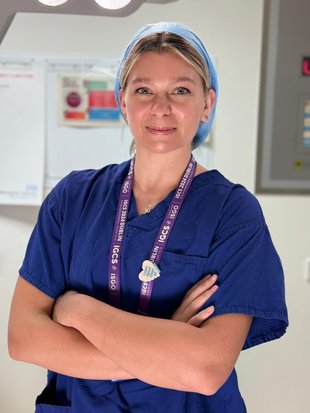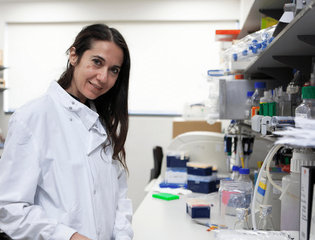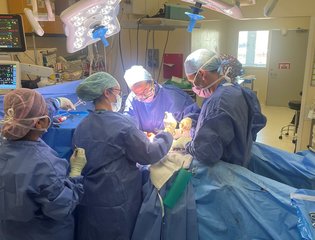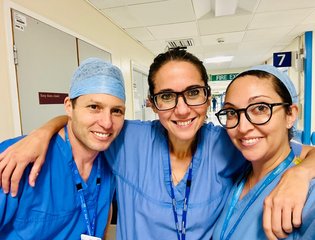Meet Dr Katie Baxter
Across the UK, too many women are still being denied the life-saving surgery they need simply because of where they live. That’s why we launched our Surgical Expertise Programme: training surgeons in world-class techniques to end the postcode lottery.
Dr Katie Baxter is our first-ever Surgical Expertise trainee. She’s already back working at her home hospital in Manchester, taking her newly trained expertise and putting it to use.
We hope, with your support, she’ll be one of many. Because every woman deserves the absolute best chance of survival.
This Christmas, the greatest gift isn’t under the tree - it’s life-saving expertise for every woman.

Dr Katie Baxter
What inspired you to become a doctor?
At school I always loved learning. The idea of learning all about anatomy, physiology and pathology etc, and then using that knowledge to help people was fascinating to me
I’ve always enjoyed working with different people, a fast pace, and having a caring role. Medicine brought all of these together and I have never looked back.
If I am honest, this early enthusiasm was probably helped along by a love for medical dramas! Luckily my life is nothing like Grey’s Anatomy now.
What do you like to do in your spare time?
Staying active helps me to decompress. I even ran a half marathon a couple of years ago to raise money for Ovarian Cancer Action, and I’ve got the photos to prove it! My husband and I are in the middle of a house renovation project, so most weekends you’ll either find me with a paintbrush in hand or out exploring with our little dog, Bonnie.
What led you to specialise in Gynaecological Oncology surgery?
I was initially drawn to gynae-oncology by the complexity of the surgery. I had planned to be a general surgeon, but once I had worked in gynaecology, I found a passion for women’s healthcare. When I discovered gynae-oncology, with its combination of complex disease and the variety of surgical skills required, it felt like the perfect fit.
I now realise that surgery is such a small part of the job. The speciality offers a huge range, from reducing risk and health promotion, to supporting women throughout every stage of their cancer journey.
What I find most exciting is how the field constantly evolves and improves, and it’s nice to be kept on your toes.
Why did you want to apply for the Surgical Expertise Programme?
Every woman with ovarian cancer should have equal access to high-quality treatment, wherever she lives. Yet time and again, we see that a woman’s chance of receiving surgery changes depending upon where she is treated.
I’ve been really fortunate to receive excellent surgical training from a very supportive team, but all my gynae-oncology training has been in one centre.
Imperial has demonstrated excellent outcomes for patients, and this programme offers the chance to see how they manage advanced ovarian cancer – and how I can integrate this into my own practice.
How did you feel when you found out you had been accepted?
Very excited! It is a great opportunity, and it fits so well with the work I have done so far in my training. I was very grateful to Ovarian Cancer Action and Imperial team for the opportunity.
What were some highlights?
Watching Professor Fotopoulou in theatre was a surgical masterclass. She is such an advocate for maximum effort cytoreduction in ovarian cancer, and it was amazing to seeing her surgical approach first hand.
What were the biggest learnings?
This experience has reinforced that, as a surgeon we can perform the most radical surgery – but that’s only part of the picture. To create meaningful, lasting change, you need to bring the whole team on board, from nurses to the other consultants.
This has been a great opportunity to gain fresh perspectives on how to manage a patient’s surgical pathway: from selecting patients for surgery, through to pre-operative care and the recognition and management of post-operative complications.
What impact will this programme have on the people you care for?
I know I can take what I’ve learnt back to Manchester and use it to give more women the chance of life-saving surgery. This includes how we make the decision to offer surgery, and also how we can reduce any negative impact on quality of life from surgery.
The surgical approach was also slightly different from what I’ve seen, and it’s given me plenty of ideas for how I might adapt my own practice.
What do you want to see improved for women with ovarian cancer?
Every woman with ovarian cancer should have equal access to high-quality treatment, wherever she lives.
What does a typical week look like for you?
On Monday we would see patients who have recently been diagnosed with cancer, as well as those coming in for follow-up treatment. This would then be followed by a local multidisciplinary team meeting where we planned out the week ahead and discuss any issues from the previous week.
Tuesday to Thursday were spent in theatre. There are two operating lists each day, so I had plenty of opportunities to observe and learn from the team.
Friday mornings would vary, sometimes being in theatre but I also had the opportunity to attend an ovarian cancer clinic that specialises in diagnosing ovarian conditions via ultrasound.
Finally, on Friday afternoons we would meet to discuss patient cases at different stages of their cancer journey. This helped me to see where my surgical practice fitted into the bigger picture.
The Surgical Expertise Programme will train and upskill the next generation of ovarian cancer surgeons, like Katie, helping to ensure every woman, wherever she lives, has the best chance of survival.


